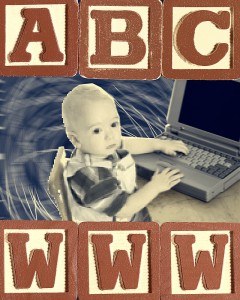Wwwhere wwwere you 20 years ago?
1993: a year that none of today’s K-12 or college students can remember. No one texted or tweeted, only some people used email, AOL was brand new, and nobody had ever “googled” anything. Nothing but the flu went viral. Friends were just that. We got bank statements and bills in the mail (yes, paper), and news came from the TV, radio, newspaper, or playground. Bill and Monica hadn’t had an Oval Office encounter yet, and the Twin Towers still towered. Many of us used computers and tried to use the Internet, but there was really nothing there.
At school, we had shifted from hand writing to typing IEPs on Apple IIe keyboards and saving them on 5 1/4 inch floppies. The library was still the magic place to find out, and my students and I were pleased to find a single source that answered our question. My interlibrary loan article requests for grad school research came back as Xerox copies from bound, printed periodicals via U.S. mail. I considered myself lucky not to have to pay for articles I needed for my research.
 Yesterday was the official 20th birthday of the world wide web. The people at CERN — who originated this re-vision of what the then-obscure Internet could be — posted their original page again to remind us of just how far we have come. What began as a way for researchers to share files and data had the most marvelous unintended consequences: Learning became both free and a matter of personal responsibility.
Yesterday was the official 20th birthday of the world wide web. The people at CERN — who originated this re-vision of what the then-obscure Internet could be — posted their original page again to remind us of just how far we have come. What began as a way for researchers to share files and data had the most marvelous unintended consequences: Learning became both free and a matter of personal responsibility.
Twenty years later, we have so many sources we must sort them for value and reliability. We can find out from anywhere. We can waste more time than mankind ever knew we had, and every year a billionaire-creating innovation rides into our lives thanks to the www. Wwwe are bewwwwilderingly dependent upon it and occasionally wwwistful for the days wwwhen wwwe wwwere free of it.
It is impossible to explain what life was like before the www. Only by talking about the cultural details of life before www can we help our students understand. Is it important for them to knowww? Yes, because learning is free and a matter of personal responsibility. They need to know the difference between having to ask for a chance to learn and having the tools available to anyone. They need to know why the www made it important to find out instead of waiting to be told. In a broader cultural/historical context, they need to know how a seemingly minor innovation can, in just a few years, change so much. They need to ask questions about impact and change.
If you have any time remaining in your end-of-year plans, give a small assignment. It can fit in any subject. Ask your students to interview an adult who was “grown up” by 1993. If you teach science, have students ask about how people learned science before the www. If you teach history, ask about how people learned history or tracked current events. If you teach English, ask how people found books to read or places to share their writing. Most importantly, have them ask when their “adult” realized that the web was changing things. Then have them share their findings on the web: blog, tweet, Faceboook post, whatever. Back in class, make sure they read what their classmates found out — and ask them wwwhy it matters. By borrowing twenty years of perspective, maybe they will realize that learning is free and a matter of personal responsibility.




I am convinced we are in the midst of making a new leap forward with the combination of wireless broadband AND smartphones and tablets. It will make the www we know now look oh so old school and fuel individualized measurable learning.
Comment by rebecca rini — May 2, 2013 @ 11:18 am